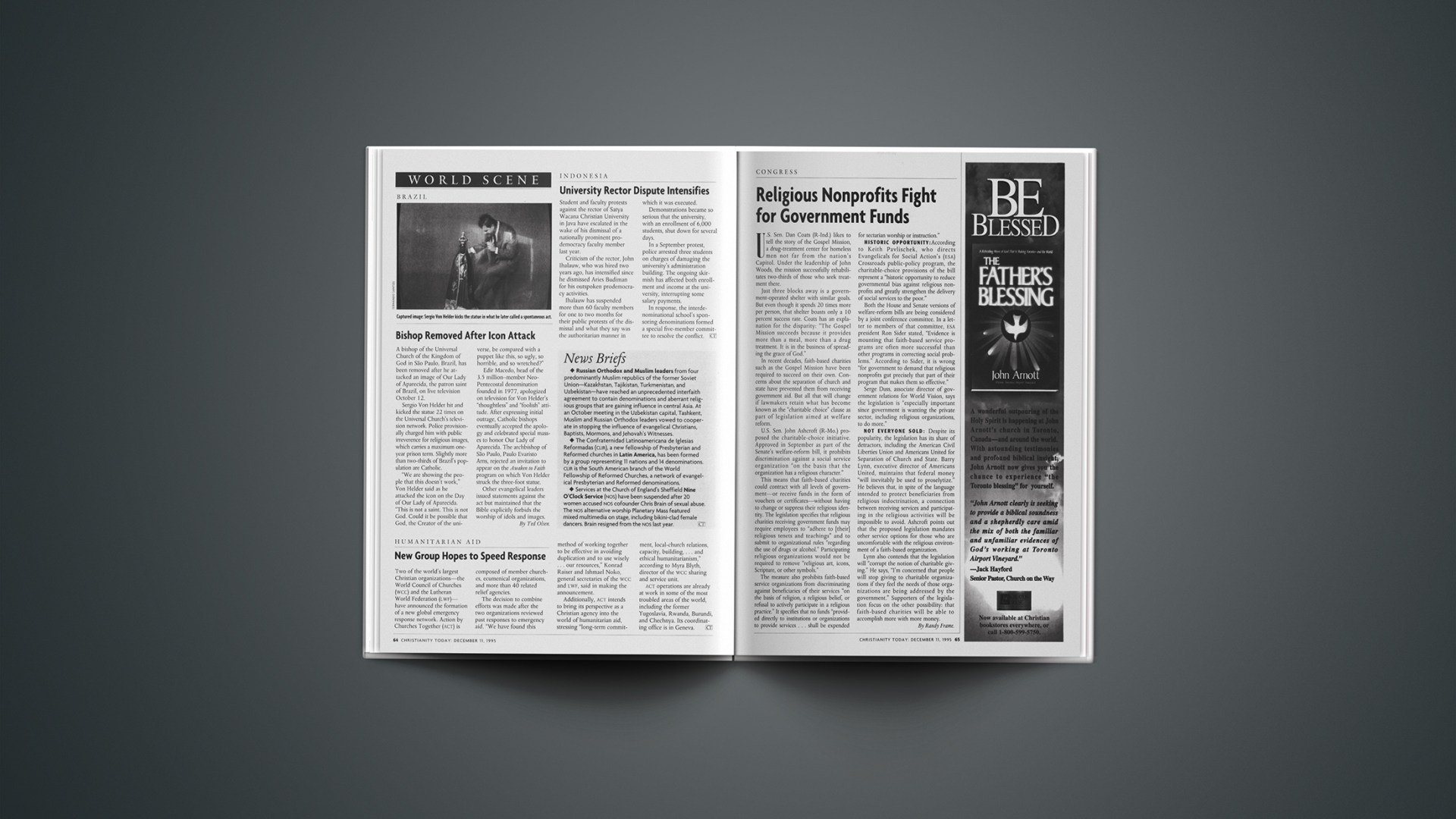U.S. Sen. Dan Coats (R-Ind.) likes to tell the story of the Gospel Mission, a drug-treatment center for homeless men not far from the nation's Capitol. Under the leadership of John Woods, the mission successfully rehabilitates two-thirds of those who seek treatment there.
Just three blocks away is a government-operated shelter with similar goals. But even though it spends 20 times more per person, that shelter boasts only a 10 percent success rate. Coats has an explanation for the disparity: "The Gospel Mission succeeds because it provides more than a meal, more than a drug treatment. It is in the business of spreading the grace of God."
In recent decades, faith-based charities such as the Gospel Mission have been required to succeed on their own. Concerns about the separation of church and state have prevented them from receiving government aid. But all that will change if lawmakers retain what has become known as the "charitable choice" clause as part of legislation aimed at welfare reform.
U.S. Sen. John Ashcroft (R-Mo.) proposed the charitable-choice initiative. Approved in September as part of the Senate's welfare-reform bill, it prohibits discrimination against a social service organization "on the basis that the organization has a religious character."
This means that faith-based charities could contract with all levels of government—or receive funds in the form of vouchers or certificates—without having to change or suppress their religious identity. The legislation specifies that religious charities receiving government funds may require employees to "adhere to [their] religious tenets and teachings" and to submit to organizational rules "regarding the use of drugs or alcohol." Participating religious organizations would not be required to remove "religious art, icons, Scripture, or other symbols."
The measure also prohibits faith-based service organizations from discriminating against beneficiaries of their services "on the basis of religion, a religious belief, or refusal to actively participate in a religious practice." It specifies that no funds "provided directly to institutions or organizations to provide services … shall be expended for sectarian worship or instruction."
HISTORIC OPPORTUNITY: According to Keith Pavlischek, who directs Evangelicals for Social Action's (ESA) Crossroads public-policy program, the charitable-choice provisions of the bill represent a "historic opportunity to reduce governmental bias against religious nonprofits and greatly strengthen the delivery of social services to the poor."
Both the House and Senate versions of welfare-reform bills are being considered by a joint conference committee. In a letter to members of that committee, ESA president Ron Sider stated, "Evidence is mounting that faith-based service programs are often more successful than other programs in correcting social problems." According to Sider, it is wrong "for government to demand that religious nonprofits gut precisely that part of their program that makes them so effective."
Serge Duss, associate director of government relations for World Vision, says the legislation is "especially important since government is wanting the private sector, including religious organizations, to do more."
NOT EVERYONE SOLD: Despite its popularity, the legislation has its share of detractors, including the American Civil Liberties Union and Americans United for Separation of Church and State. Barry Lynn, executive director of Americans United, maintains that federal money "will inevitably be used to proselytize." He believes that, in spite of the language intended to protect beneficiaries from religious indoctrination, a connection between receiving services and participating in the religious activities will be impossible to avoid. Ashcroft points out that the proposed legislation mandates other service options for those who are uncomfortable with the religious environment of a faith-based organization.
Lynn also contends that the legislation will "corrupt the notion of charitable giving." He says, "I'm concerned that people will stop giving to charitable organizations if they feel the needs of those organizations are being addressed by the government." Supporters of the legislation focus on the other possibility: that faith-based charities will be able to accomplish more with more money.
Copyright © 1995 Christianity Today. Click for reprint information.
ctcurrmrj5TE0655B29










